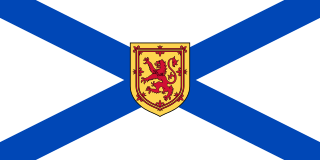
Nova Scotia is one of the thirteen provinces and territories of Canada. It is one of the three Maritime provinces and one of the four Atlantic provinces. Nova Scotia is Latin for "New Scotland".
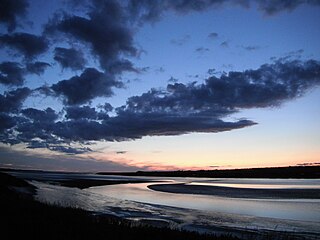
Truro is a town in central Nova Scotia, Canada. Truro is the shire town of Colchester County and is located on the south side of the Salmon River floodplain, close to the river's mouth at the eastern end of Cobequid Bay.
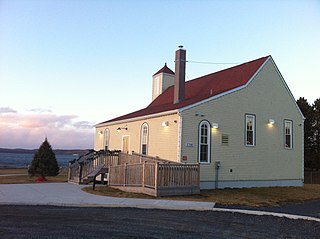
Africville was a small community of predominantly African Nova Scotians located in Halifax, Nova Scotia, Canada. It developed on the southern shore of Bedford Basin and existed from the early 1800s to the 1960s. From 1970 to the present, a protest has occupied space on the grounds. The government has recognized it as a commemorative site and established a museum here. The community has become an important symbol of Black Canadian identity, as an example of the "urban renewal" trend of the 1960s that razed similarly racialized neighbourhoods across Canada, and the struggle against racism.

Percy Alonzo Paris is a former Canadian politician from Nova Scotia. He represented the constituency of Waverley-Fall River-Beaver Bank in the Nova Scotia House of Assembly for the Nova Scotia New Democratic Party from 2006 to 2013.
Delmore William "Buddy" Daye was a Canadian professional boxer and community activist.

The Colored Hockey League of the Maritimes (CHL) was an all-black ice hockey league founded in Nova Scotia in 1895, which featured teams from across Canada's Maritime Provinces. The league operated for several decades lasting until 1930.
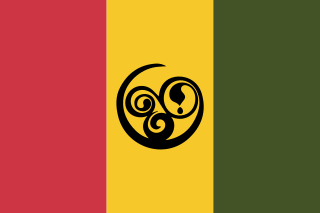
Black Nova Scotians are an ethnic group consisting of Black Canadians whose ancestors primarily date back to the Colonial United States as slaves or freemen, later arriving in Nova Scotia, Canada, during the 18th and early 19th centuries. As of the 2021 Census of Canada, 28,220 Black people live in Nova Scotia, most in Halifax. Since the 1950s, numerous Black Nova Scotians have migrated to Toronto for its larger range of opportunities. The first recorded free African person in Nova Scotia, Mathieu da Costa, a Mikmaq interpreter, was recorded among the founders of Port Royal in 1604. West Africans escaped slavery by coming to Nova Scotia in early British and French Colonies in the 17th and 18th centuries. Many came as enslaved people, primarily from the French West Indies to Nova Scotia during the founding of Louisbourg. The second major migration of people to Nova Scotia happened following the American Revolution, when the British evacuated thousands of slaves who had fled to their lines during the war. They were given freedom by the Crown if they joined British lines, and some 3,000 African Americans were resettled in Nova Scotia after the war, where they were known as Black Loyalists. There was also the forced migration of the Jamaican Maroons in 1796, although the British supported the desire of a third of the Loyalists and nearly all of the Maroons to establish Freetown in Sierra Leone four years later, where they formed the Sierra Leone Creole ethnic identity.
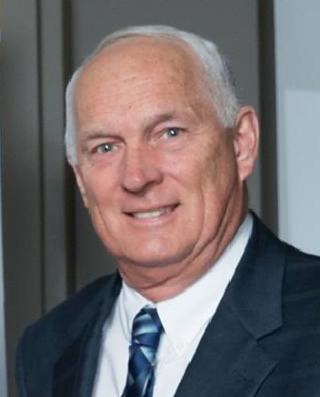
Pat Dunn is a Canadian politician. He has represented the electoral district of Pictou Centre in the Nova Scotia House of Assembly from 2006 to 2009, and from 2013 to present, as a member of the Progressive Conservatives. He served as Minister of Health Promotion and Protection in the Executive Council of Nova Scotia.
Moses "Daddy Moses" Wilkinson or "Old Moses" was an American Wesleyan Methodist preacher and Black Loyalist. His ministry combined Old Testament divination with African religious traditions such as conjuring and sorcery. He gained freedom from slavery in Virginia during the American Revolutionary War and was a Wesleyan Methodist preacher in New York and Nova Scotia. In 1791, he migrated to Sierra Leone, preaching alongside ministers Boston King and Henry Beverhout. There, he established the first Methodist church in Settler Town and survived a rebellion in 1800.

Higher education in Nova Scotia refers to education provided by higher education institutions. In Canada, education is the responsibility of the provinces and there is no Canadian federal ministry governing education. Nova Scotia has a population of less than one million people, but is home to ten public universities and the Nova Scotia Community College, which offers programs at 13 locations.
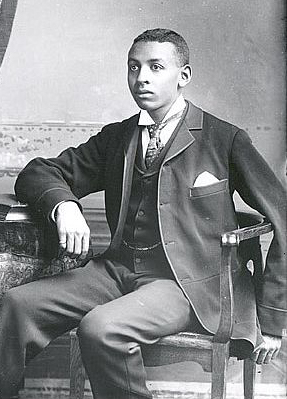
James Robinson Johnston was a Canadian lawyer and community leader.
Sylvia D. Hamilton is a Canadian filmmaker, writer, poet, and artist. Based in Nova Scotia, her work explores the lives and experiences of people of African descent. Her special focus is on African Nova Scotians, and especially women. In particular, her work takes the form of documentary films, writing, public presentations, teaching, mentoring, extensive volunteer work and community involvement. She has uncovered stories of struggles and contributions of African Canadians and introduced them to mainstream audiences. Through her work, she exposes the roots and the presence of systemic racism in Canada. She aims to provide opportunities for Black and Indigenous youth through education and empowerment.

New Horizons Baptist Church is a Baptist church in Halifax, Nova Scotia that was established by Black Refugees in 1832. When the chapel was completed, black citizens of Halifax were reported to be proud because it was evidence that former slaves could establish their own institutions in Nova Scotia. Under the direction of Richard Preston, the church laid the foundation for social action to address the plight of Black Nova Scotians. It is affiliated with the Canadian Baptists of Atlantic Canada.

William Pearly Oliver worked at the Cornwallis Street Baptist Church for twenty-five years (1937–1962) and was instrumental in developing the four leading organizations to support Black Nova Scotians in the 20th century: Nova Scotia Association for the Advancement of Colored People (1945), the Nova Scotia Human Rights Commission (1967), the Black United Front (1969) and the Black Cultural Centre for Nova Scotia (1983). He was instrumental in supporting the case of Viola Desmond. Oliver was awarded the Order of Canada in 1984.
The Nova Scotia Home for Colored Children is an orphanage in Halifax, Nova Scotia that opened on June 6, 1921. It was built, because at the time, white home care institutions would not accept black children in need. In the 1960s segregation was coming to an end, and black people were being integrated into white institutions. In the present day, the building is used as a meeting place for community groups. The home came under fire when many former residents came forward with allegations of abuse they experienced during their time at the home, which ended in a class action lawsuit, an apology from the Premier of Nova Scotia and the establishment of an official Public Inquiry into the abuses at the Home. The public inquiry, established under the Nova Scotia Public Inquiries Act was the first of its kind to take a restorative approach to its work. The Restorative Inquiry for the Nova Scotia Home for Colored Children completed its work and released it final report "Journey to Light: A Different Way Forward - Final Report of the Restorative Inquiry - Nova Scotia Home for Colored Children" in November 2019.
Louisa Ann Johnson was a Canadian merchant and church supporter of African descent.
Elizabeth Ann Cromwell was an African Nova Scotian and Black Loyalist. She dedicated her career to the celebration of African Nova Scotian History and recognising the experiences of the Birchtown black loyalists. She was recognised with an Order of Nova Scotia in 2019.
Donald D. Skeir was a Canadian pastor, community leader, and educator in the African Nova Scotian community.
Edwin Howard Borden was an early African Nova Scotian scholar who had a distinguished career as a pastor, professor, and author in the United States.
Peter Evander McKerrow was the first Afro-Caribbean-Canadian author and the first Black historian in Nova Scotia.










